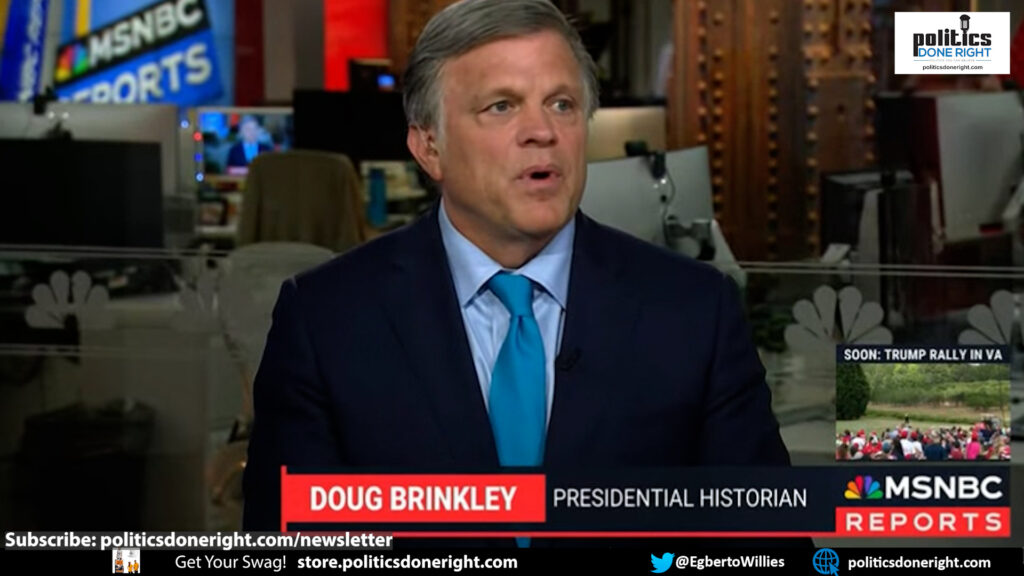Historian Doug Brinkley believes that Biden should make Kamala Harris the President, which would excite the base that can go toe to toe with Trump.
Kamala Harris, President?
Podcasts (Video — Audio)
In a dynamic political landscape where every decision carries profound implications, Doug Brinkley’s recent proposal that President Joe Biden should consider stepping aside and handing the reins to Vice President Kamala Harris has sparked debate and speculation. Brinkley, a distinguished presidential historian, argues that such a move could invigorate the Democratic Party, energize key voter demographics, and effectively combat the looming threat of a Donald Trump resurgence in American politics.
At the heart of Brinkley’s suggestion lies a recognition of the pivotal moment facing the Biden administration. Despite commendable achievements and widespread approval among progressives for his handling of economic policies and bipartisan initiatives, Biden’s recent public appearances have raised concerns about his ability to sustain momentum and galvanize support for the upcoming elections. Brinkley draws a historical parallel to Lyndon B. Johnson’s pivotal decision in 1968 to withdraw from the presidential race, a move that reshaped the political landscape of its time.
Central to Brinkley’s argument is the assertion that Biden’s legacy could be best served by ensuring a seamless leadership transition to Vice President Kamala Harris. Harris, the first woman and woman of color to hold the office of Vice President, represents a potent symbol of inclusivity and progress in American politics. By elevating Harris to the presidency, Biden could cement his legacy as a unifier and consensus-builder and capitalize on the historic significance of Harris’s potential ascension to the highest office in the land.
Moreover, Brinkley emphasizes Harris’s candidacy’s strategic advantage in countering Donald Trump’s divisive rhetoric and policies. As a seasoned prosecutor and advocate for social justice, Harris embodies a stark contrast to Trump’s polarizing leadership style. Her candidacy, Brinkley argues, could inspire a groundswell of support among women, minorities, and younger voters who are crucial to securing Democratic victories in future elections.
Critics of Brinkley’s proposal may argue that such a decision could destabilize the Democratic Party or undermine Biden’s achievements. However, Brinkley counters that the party’s resilience lies in its ability to adapt and embrace new leadership paradigms that reflect the evolving aspirations of the electorate. He suggests that Biden’s stepping aside could be considered an act of selflessness and strategic foresight, ensuring that the Democratic Party remains at the forefront of progressive policies and inclusive governance.
In evaluating Brinkley’s proposition, it becomes evident that the stakes are high, and the decisions made by Biden and his advisors in the coming months will have far-reaching consequences. The specter of a potential Trump comeback looms large, energizing his base and galvanizing opposition to Democratic policies. Brinkley’s call for a proactive approach underscores the urgency of the moment, urging Democrats to seize the initiative and mobilize behind a candidate capable of uniting disparate factions within the party.
Looking ahead, the Democratic Party stands at a crossroads, grappling with internal debates over strategy, leadership, and the path forward in an increasingly polarized political landscape. These deliberations have a sense of urgency and possibility, challenging conventional wisdom and advocating for bold, visionary leadership that reflects the aspirations and values of a diverse and dynamic electorate.
Advocating for President Biden to consider facilitating Kamala Harris’ ascension to the presidency represents a bold and forward-thinking approach to navigating the complexities of contemporary American politics. By embracing the historic opportunity to elevate Harris, Biden and the Democratic Party can reaffirm their commitment to inclusive governance, progressive ideals, and the enduring promise of American democracy in the face of formidable challenges. As the debate unfolds, the nation watches closely, mindful of the profound implications of this pivotal moment in history.
Viewers are encouraged to subscribe and join the conversation for more insightful commentary and to support progressive messages. Together, we can populate the internet with progressive messages that represent the true aspirations of most Americans.

